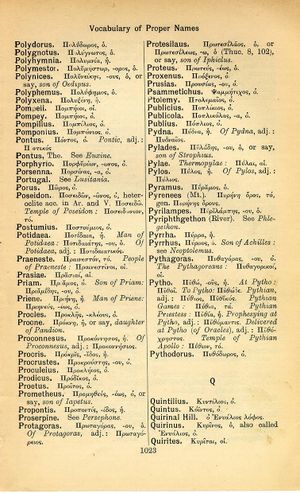Polynices: Difference between revisions
From LSJ
Οὐκ ἔστι πενίας οὐδὲ ἓν μεῖζον κακόν → Non ullum paupertate maius est malum → Als Armut gibt es keine größre Schlechtigkeit
(3_10) |
m (Text replacement - "}}]]" to "}}]]") |
||
| Line 1: | Line 1: | ||
{{WoodhouseENELnames | {{WoodhouseENELnames | ||
|Text=[[File:woodhouse_1023.jpg|thumb | |Text=[[File:woodhouse_1023.jpg|thumb | ||
|link={{filepath:woodhouse_1023.jpg | |link={{filepath:woodhouse_1023.jpg}}]]Πολυνείκης, -ους, ὁ, or say, <b class="b2">son of Oedipus.</b> | ||
}} | }} | ||
{{Lewis | {{Lewis | ||
Revision as of 10:10, 15 August 2017
English > Greek (Woodhouse)
Πολυνείκης, -ους, ὁ, or say, son of Oedipus.
Latin > English (Lewis & Short)
Pŏlȳnīces: is, m., = Πολυνείκης,
I son of Œdipus and Jocasta, brother of Eteocles, and son-in-law of Adrastus, Stat. Th. 7, 689; Hyg. Fab. 68; 72; Quint. 5, 10, 31; Plin. 35, 11, 40, § 144.
Latin > French (Gaffiot 2016)
Pŏlўnīcēs, is, m. (Πολυνείκης), Polynice [fils d’Œdipe et frère d’Étéocle] : Plin. 35, 144.
Latin > German (Georges)
Polynīcēs, is, m. (Πολυνείκης), Sohn des Ödipus, Bruder des Eteokles u. Schwiegersohn des Adrastus, der im Kampfe um das thebanische Reich (s. Eteoclēs) seinen Bruder Eteokles zum Zweikampf herausforderte, in dem beide fielen, Hyg. fab. 68 u. 72. Plin. 35, 144. Stat. Theb. 7, 689.

